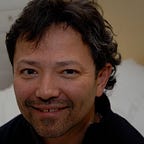Deleuze and Fragmentation 5
Perspectivism and the 20th Century: A Metaphysic of Difference
While this series of articles is in no way is intended to be a comprehensive investigation into the social, cultural and political dynamics of the 20th century, we can view certain movements and events during this time period, including both modernism and postmodernism, through the lens of perspectivism.
Major movements in art, science and philosophy, as well as global political events and societal changes can be seen as a history of attempts at coming to terms with heterogeneity and difference.
Modernism and postmodernism can be viewed as a progression and evolution of learning to ride the line of flight of perspectivism, learning how to be open and new. Perspectivism is at all times susceptible to sliding on the one side into universality, or on the other, into meaningless and nihilism.
New Lines of Flight
If perspectivism leaves a void that needs to be filled, the loss of universal meaning, perhaps by creating new lines of flight we can come to embrace perspectivism without sliding into the terror of meaninglessness.
We can take note of the rise of an evolution of thought: from a yearning for a new unified perspective, a canopy of meaning, of hidden structures, through to skepticism regarding structures, and on to an embracing of a multiplicity of perspectives:
Meaning found only in the particular, lacking all universality and abstraction; fragile but real, daring but courageous.
A subject de-centered, man in nature not above nature, and a plurality of life organic and inorganic, can be our vantage point.
Nietzsche’s Foresight
There can be a homogeneity to heterogeneity; in fact it was always implied in Nietzsche’s perspectivism. That homogeneity is perspective itself: the acceptance of many perspectives, an embracing of pure difference, an affirmation of plurality:
Pluralism = Monism
Nietzsche’s perspectivism is both critical and positive: denouncing dogmatic philosophy for ignoring the limits of theory, but also encouraging us all to create value.
Knowledge does not involve a form of objectivity behind all subjective appearances, that reveals the way things really are. We can focus on the differences in perspective, and gain insight into reality. We can obtain to a multiplicity of perspectives that shift:
Never a view from nowhere, but a multitude of vantage points.
Creativity and Expression
Perspectivism traces back to the will to power, the drives and affects that compete for a point of view. And we can characterize perspectives as epistemological, but also ethical and ontological:
Reality and our place in it as a system of ever shifting force centers that constitute a multiplicity of orientations in relation to a connected and unfolding reality that is in a perpetual state of flux.
Perspectivism is creativity and expression over truth, the power to grasp pure difference.
Perspectivism is bringing creativity to all activities we engage in, including art, philosophy, science, and an understanding of our own history.
We are alive when we make ourselves mobile in perspective, when we spontaneously link affect, sensibility and the idea; the emotional basis for thought, the will to power.
We are alienated when we cover over in abstraction, and in doing so, eliminate ourselves from the equation.
Perspectives, pragmatic, process-oriented, and consciously paradigmatic, remain open. Only when a perspective closes down on life, hides the new and open from sight, should we turn the other way.
Affirming Fragmentation
A metaphysic of difference affirms fragmentation.
Authority and experience compete for dominance; authority as unity, experience as perspectives. But eventually change and difference breakdown identity and structure.
The static authority of the abstract is no match for the dynamic, pluralistic flux of experience.
Reactionary Forces in Society
Reactions to postmodernism demand a return to structure and unity, objective truth: the rise of the religious and traditional, a reaffirmation of human progress and domination of the planet, an unbridling of technology apace, and the terror of control societies; instantaneous observation of all human activity, sliding us once again towards a new nihilism: a techno-humanity.
But in parallel, a new constructivism has arisen:
A postmodernity leading away from skepticism towards a new metaphysic that embraces difference, heterogeneity, and a de-centering of subject.
Always first and foremost an ethic that affirms life, organic and inorganic. Postmodern ambivalence evolves into Deleuze’s philosophy of difference:
A positive and life affirming reformulation of Nietzsche’s perspectivism and the will to power.
I hope you enjoyed this article. Thanks for reading!
Tomas
Please join my email list here or email me at tomas@tomasbyrne.com.
Excerpt from my forthcoming book, Becoming: A Life of Pure Difference (Gilles Deleuze and the Philosophy of the New) Copyright © 2021 by Tomas Byrne. Learn more here.
